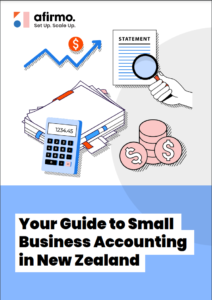Welcome to the world of small business accounting in New Zealand! If you are a small business owner in New Zealand, it is crucial you understand the basics of accounting and bookkeeping. These two concepts serve as the foundation of your business’s financial management.
You’ll need to keep track of your finances, taxes, revenues, and expenses, and those are just the start. Here we provide you with an overview of small business accounting and bookkeeping in New Zealand and highlight the differences between them.
Whether you’re just getting started, a budding entrepreneur, a seasoned business owner, or simply someone wanting to gain a deeper understanding of accounting practices, we will equip you here with knowledge and tools to begin to navigate the complexities of small business accounting with confidence and ease.
We’ll delve into the world of financial statements, helping you make sense of balance sheets, income statements, and cash flow statements – all of which will help you understand the health of your business and make informed decisions.
Our aim is to make small business accounting feel less daunting and more empowering. Everyone at Afirmo wants you to feel confident in your ability to manage your finances, and better understand the financial pulse of your business.
So, whether you’re sipping a flat white in Auckland, exploring the stunning landscapes of Queenstown, or running your business from anywhere in New Zealand, let’s embark on this accounting adventure together!
Get ready to unlock the secrets of small business accounting in New Zealand and embark on a journey towards financial success. Let’s dive in!
What is Small Business Accounting?
Small business accounting aims to help business owners understand and track their financial situation more effectively.
The process begins with a chart of accounts outlining all the categories where you’ll record financial data, from revenues to expenses, and from assets to liabilities.
Cloud accounting software like Afirmo’s will allow you to record transactions automatically. Bank feeds and coding rules recognise, categorise, and reconcile ordinary transactions every month.
It is also essential to have an accounts payable system that enables you to pay vendors and purchase inventory and other essential supplies. Having an accounting system for small businesses in place will help you save much time and money, reduce errors, and ensure that your books are accurate.
What is Small Business Bookkeeping?
Bookkeeping is not the same as accounting. Bookkeeping primarily deals with recording the financial transactions of your business, while accounting deals with analysing those transactions.
Bookkeeping involves creating and maintaining records of transactions, including purchases, sales, receipts, payments, and other financial transactions.
In simple terms, bookkeeping is the process of recording financial transactions and keeping book records.
Many small businesses outsource their bookkeeping tasks to bookkeepers, or they integrate it with their accounting systems, with online services such as Afirmo, usually ensuring transactions are coded consistently or matched to sales invoices or expense claims before accurate financial reports are available.
The Differences between Accounting and Bookkeeping:
People tend to think of Accounting and Bookkeeping as interchangeable, however, they are quite distinct.
Accounting and bookkeeping are both essential aspects of your business’s financial management, but the fundamental difference between them is that bookkeeping is concerned with recording financial transactions, while accounting is concerned with analysing them. Bookkeeping is the foundation of accounting, and the data it generates must be accurate before it is entered into the accounting system for measuring the financial performance of a company.
Accounting, on the other hand, requires an advanced level of skill and knowledge, as it involves financial analysis, reporting, management and interpretation, and then financial decision-making.
Conclusion:
In summary, small business accounting is vital to track and monitor your business financial transactions, and bookkeeping is a more focused financial task of recording transactions.
For start-ups and small businesses, both are crucial. Investing in cloud-based accounting software like Afirmo, makes the process easy for businesses and can help you stay compliant.
If you need assistance with accounting or bookkeeping, it is always advisable to seek help from experts such as Afirmo, who can assist you in managing your finances and ensuring that your books are accurate and in order.
Make sure to understand the difference between the two concepts, and you’ll have a solid foundation for financial management for your small business.


